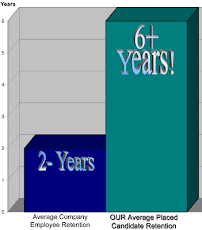Saturday
Interpreting the Answers to “15 Interview Questions…”
By, Russ Riendeau, Ph.D.
What question do you have for me right away?
Look for preparation, substantial questions, focus, poise, and the ability to think on ones feet. This question allows you to show you’re wanting to have a dialogue.
What would really surprise me about you? What else?
This question allows candidates to reveal a different side of themselves. Look for confidence, willingness and candor. The second question (“What else?”) gives the candidate another chance to reveal more if they gave a conservative first response.
What’s your real motivation to change jobs? No, the real reason?
Look for motives other than money--money is rarely the real reason. See if the candidate places blame; is seeking asylum elsewhere; can’t handle the pressure, the boss or the pace. These are signs of immaturity, poor-decision making skills or lack of true selling ability. Ask the question to check to see if you’re hearing the whole story.
What’s your philosophy on goal setting?
The more detailed answer you get, the more you’ll see if the candidate values setting and achieving goals. Ask for examples of goals they have set and how they measured them. A blend of intrinsic and extrinsic goals will show emotional balance and another sign of maturity in prioritizing ability.
What reading material would I find on your coffee table, nightstand or kitchen table?
The answer to this question will show intellect, curiosity, variety of interests, breath of life experience, dedication to learning, or lack of these traits. The candidate’s response will give insights as to how well he or she follows your industry and field of work.
Tell me a story about when you were placed in an ethical dilemma and what happened?
This question reveals morals, ethics, integrity and problem-solving skills. If the candidate places blame on others, it may indicate tendencies towards poor judgment, unrealistic attitudes, non-genuine or secretive personality.
How did you earn money while in college?
This question offers a good indicator of the candidate’s entrepreneurial skills. If they ran a formal or informal business in college, they are most likely resourceful, driven, have strong social skills and street smarts. These candidates tend to be good at sales, marketing, customer service or other roles that require proactive behaviors.
How far away from home have you traveled? (Have a map on your desk.)
Allows for storytelling with better visuals and allows person to share travels and gives you insights into drive, personal interests and how well they communicate outside of business issues. Can show more about risk-taking, social and cultural differences and ability to travel safely and effectively for work.
Draw me a pie chart showing how you spend an eight-hour day.
Watch for organization, clear communications and accurate calculations. Their response shows you their presentation and communication skills. Are those skills in line with what you need?
Are you a curious person, and if so, show me an example?
The example they give shows you how well they can communicate, persuade, sell, entertain or motivate others. Also, is their curiosity connected to their drive and need to win or to something else?
What’s your favorite success story and failure story?
A person willing to share failures tends to be self-confident, mature and has a sense of true self and place in the world. In success stories, look for credit given to team effort and personal drive in relation to goal setting. Bragging of solo efforts may suggest arrogance, inflated sense of self, lack of self-confidence or lack of interest in being a team player.
What should I have asked you that I haven’t?
This question allows the candidate to respond by closing and asking for the job or to address hidden concerns of their ability to do the job.
Do you want to be a millionaire? Why? What are you doing to prepare for it?
Look for an overall balanced approach to wealth and lifestyle choice and for consistency relative to other questions around goal setting. Does the candidate have a valid, compelling motive for a yes or no to wealth accumulation?
Are you ready to resign from your job in five days? What will your firm do when you quit? What will they say about you after you have left the company?
The answers here show the seriousness and commitment of the candidate. A person committed to changing jobs will not hesitate when asked if they’re ready to resign. If the candidate presents a counteroffer, tell him/her that you do not believe in the success of counteroffers and that you will not negotiate against a counteroffer.
Have you ever created a 30, 60, 90-day strategic plan?
If the candidate has created strategic plans, how many months were they required to plan out into the future? Is this commensurate with the requirements of position you’re offering? Ask about a specific plan and watch for ability to articulate and define time frames and goals. Many people can speak about planning, so ask candidate to illustrate the plan using visual aids, graphs, charts, etc.
Vistage speaker and member Russ Riendeau , PhD has been in the executive search business since 1985. He is Senior Partner of The East Wing Search Group. He’s also the co-author of a new book, “The CEO’s Guide to Talent Acquisition.” He can be reached at www.eastwingsearchgroup.com, or 847-381-0977
What question do you have for me right away?
Look for preparation, substantial questions, focus, poise, and the ability to think on ones feet. This question allows you to show you’re wanting to have a dialogue.
What would really surprise me about you? What else?
This question allows candidates to reveal a different side of themselves. Look for confidence, willingness and candor. The second question (“What else?”) gives the candidate another chance to reveal more if they gave a conservative first response.
What’s your real motivation to change jobs? No, the real reason?
Look for motives other than money--money is rarely the real reason. See if the candidate places blame; is seeking asylum elsewhere; can’t handle the pressure, the boss or the pace. These are signs of immaturity, poor-decision making skills or lack of true selling ability. Ask the question to check to see if you’re hearing the whole story.
What’s your philosophy on goal setting?
The more detailed answer you get, the more you’ll see if the candidate values setting and achieving goals. Ask for examples of goals they have set and how they measured them. A blend of intrinsic and extrinsic goals will show emotional balance and another sign of maturity in prioritizing ability.
What reading material would I find on your coffee table, nightstand or kitchen table?
The answer to this question will show intellect, curiosity, variety of interests, breath of life experience, dedication to learning, or lack of these traits. The candidate’s response will give insights as to how well he or she follows your industry and field of work.
Tell me a story about when you were placed in an ethical dilemma and what happened?
This question reveals morals, ethics, integrity and problem-solving skills. If the candidate places blame on others, it may indicate tendencies towards poor judgment, unrealistic attitudes, non-genuine or secretive personality.
How did you earn money while in college?
This question offers a good indicator of the candidate’s entrepreneurial skills. If they ran a formal or informal business in college, they are most likely resourceful, driven, have strong social skills and street smarts. These candidates tend to be good at sales, marketing, customer service or other roles that require proactive behaviors.
How far away from home have you traveled? (Have a map on your desk.)
Allows for storytelling with better visuals and allows person to share travels and gives you insights into drive, personal interests and how well they communicate outside of business issues. Can show more about risk-taking, social and cultural differences and ability to travel safely and effectively for work.
Draw me a pie chart showing how you spend an eight-hour day.
Watch for organization, clear communications and accurate calculations. Their response shows you their presentation and communication skills. Are those skills in line with what you need?
Are you a curious person, and if so, show me an example?
The example they give shows you how well they can communicate, persuade, sell, entertain or motivate others. Also, is their curiosity connected to their drive and need to win or to something else?
What’s your favorite success story and failure story?
A person willing to share failures tends to be self-confident, mature and has a sense of true self and place in the world. In success stories, look for credit given to team effort and personal drive in relation to goal setting. Bragging of solo efforts may suggest arrogance, inflated sense of self, lack of self-confidence or lack of interest in being a team player.
What should I have asked you that I haven’t?
This question allows the candidate to respond by closing and asking for the job or to address hidden concerns of their ability to do the job.
Do you want to be a millionaire? Why? What are you doing to prepare for it?
Look for an overall balanced approach to wealth and lifestyle choice and for consistency relative to other questions around goal setting. Does the candidate have a valid, compelling motive for a yes or no to wealth accumulation?
Are you ready to resign from your job in five days? What will your firm do when you quit? What will they say about you after you have left the company?
The answers here show the seriousness and commitment of the candidate. A person committed to changing jobs will not hesitate when asked if they’re ready to resign. If the candidate presents a counteroffer, tell him/her that you do not believe in the success of counteroffers and that you will not negotiate against a counteroffer.
Have you ever created a 30, 60, 90-day strategic plan?
If the candidate has created strategic plans, how many months were they required to plan out into the future? Is this commensurate with the requirements of position you’re offering? Ask about a specific plan and watch for ability to articulate and define time frames and goals. Many people can speak about planning, so ask candidate to illustrate the plan using visual aids, graphs, charts, etc.
Vistage speaker and member Russ Riendeau , PhD has been in the executive search business since 1985. He is Senior Partner of The East Wing Search Group. He’s also the co-author of a new book, “The CEO’s Guide to Talent Acquisition.” He can be reached at www.eastwingsearchgroup.com, or 847-381-0977
Subscribe to:
Post Comments (Atom)














No comments:
Post a Comment